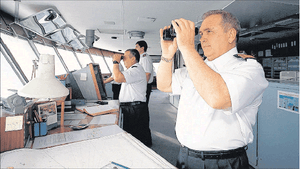Power through prayer
‘After they prayed, the place where they were meeting was shaken, and they were all filled with the Holy Spirit and spoke the Word of God boldly’ (Acts 4:31).
The apostles called upon God in their weakness and he filled them afresh with the mighty power of the Holy Spirit. But have we got used to a Christianity without power? Isn’t lack of power the ‘elephant in the room’ we so often ignore?
Many of us are not lacking in new ideas and initiatives; and we should be bold, innovative, contemporary and intelligent in addressing the great challenges we face. But, without the power of God, these won’t make much difference; we will be firing with ‘blank cartridges’!
It’s not only our preaching, but so much more today that takes place ‘in word only’ and desperately lacks ‘the power and demonstration of the Holy Spirit’ (1 Thessalonians 1:5; 1 Corinthians 2:2). What has happened to the dunamis — or ‘dynamite’ — of the Holy Spirit among us?
Holy Spirit
When we are so lacking in power, it seems strange and unbiblical that there is little emphasis in our churches on the Holy Spirit. In the Acts, everything God so wonderfully does among them is by the power of the Holy Spirit.
Nothing happened until the Holy Spirit was poured out on the day of Pentecost. So it was in Acts 4; and in Acts 12 when Peter was in prison; and, again, in Acts 13 at the birth of the worldwide missionary movement. And it’s the same throughout church history.
Christianity is not just sociological, but supernatural and powerful. ‘You will receive power when the Holy Spirit comes on you, and you will be my witnesses’ (Acts 1:8).
Every conversion is supernatural regeneration. That ‘power’ depends upon the life-giving Spirit. Only the Holy Spirit can give preachers a convicting and converting ministry; and make our personal witnessing effective and open the doors of opportunity for us to reach into our communities.
I was speaking recently with a godly, old Wesleyan Reform Methodist, and when I mentioned the Holy Spirit, he immediately interrupted with, ‘Ah! That’s what’s missing!’
Have we overreacted to Charismaticism and thrown out the precious baby with the bath water? Are we now quenching and grieving the Holy Spirit, and therefore robbing ourselves of our greatest need — the evident, manifest power of God among us?
We all know that one sermon preached in the power of the Holy Spirit can achieve more than 1,000 without this. It is said that no less than 2,500 persons were added to the church in Caernarvonshire through one extraordinary sermon preached at Pwllheli by John Elias.
Surely, when our need for divine power is so great, the devil’s deception must be behind our present neglect of the Holy Spirit. Jesus made it clear that the Spirit will be given to those who ask him.
Urgent prayer
Doesn’t this need to be a fresh and urgent note in our prayer meetings: urgent, persistent prayer for the Spirit to be poured out upon us in abundant measure?
In Acts 4 they experienced the awesome presence of God after they had prayed. The place where they were meeting was shaken, and they were all filled with the Holy Spirit and spoke the Word of God boldly.
This was exceptional. But prayer is a spiritual encounter with the living God and he is always likely to draw near and make himself known experientially. Many of our forefathers looked for and expected this, whereas we seldom do.
Prayer is so much more precious when there is some felt experience of the Lord. Today we can be very cerebral and seem almost content to be like this.
Don Carson says, ‘Biblical knowledge can be merely academic and rigorous, but somehow not edifying, not life-giving, not devout, not guileless … The one thing we most need in Western Christendom is a deeper knowledge of God. We need to know God better. When it comes to knowing God we are a culture of the spiritually stunted’.
Unless we are incredibly disciplined, prayer tends to be rushed with little time to seek the face of Christ. One of my former assistants at Pontefract promised at his induction ‘to seek to pray into the presence of God every day’.
A young evangelist, working in Burundi, wrote in his diary: ‘God has blessed me with times of unbelievable intimacy. I’ve wept with love for him, joy in him, desperation for friends and family who are currently rejecting him. How can they miss out on this? It’s so real, so big, so important. I must give all; not just most, but all’.
Heart knowledge
When we know little of that ‘unbelievable intimacy’, prayer itself loses its privilege and attraction. Therefore we can lose our spiritual appetite and passion for prayer and the prayer meeting.
If you were struggling with intellectual doubts (and many of us will at some point), shouldn’t your intimate experience of Christ and his providential handling of your life rise up and challenge those doubts?
Beware of just being mentally attracted to and convinced about Christianity, but without an intimate, experiential knowledge of Christ. Is it any wonder that such leads to little burden for the spiritual and costly activity of wrestling prayer?
We all need to fight to maintain spiritual reality and an experiential knowledge of God at the heart of our prayer, preaching and church life. The building may not shake when we pray, but we should be looking to our living Lord to draw near, and for an
assuring taste of his gracious presence.
As he did in the Acts, God will answer such pleas. As he enriches our private prayer, so he will increase our passion for public prayer in the church prayer meetings. And — praise God! — he is still able to do immeasurably more than all we can ask or even think.
Bill Dyer











